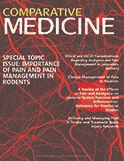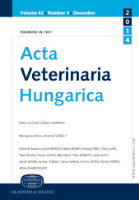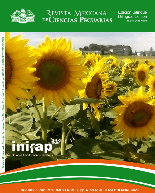
COMPARATIVE MEDICINE
Scope & Guideline
Fostering dialogue in the realm of comparative medicine.
Introduction
Aims and Scopes
- Laboratory Animal Science:
The journal covers a wide array of topics within laboratory animal science, including housing, care, and management of various species used in research settings. - Animal Models in Biomedical Research:
A central theme is the use of animal models to study human diseases, enabling researchers to gain insights into pathophysiology, treatment, and drug development. - Veterinary and Clinical Research:
Research involving veterinary medicine and clinical practices for laboratory animals is highlighted, providing essential information on health management and disease prevention. - Ethics and Welfare in Animal Research:
The journal emphasizes the ethical considerations and welfare implications of using animals in research, advocating for humane endpoints and improved living conditions. - Innovative Research Methodologies:
There is a consistent focus on developing and validating novel research methodologies that enhance the reliability and reproducibility of experimental results.
Trending and Emerging
- Microbiome Research:
There is a growing interest in the role of the microbiome in health and disease, with studies exploring its effects on various conditions, including gastrointestinal health and immune responses. - Translational Research Approaches:
An increasing number of publications focus on translational research that bridges the gap between basic science and clinical applications, particularly in developing new therapies. - Xenotransplantation Studies:
Research exploring the use of animal organs for transplantation in humans is gaining traction, particularly with pigs as potential donors, addressing the critical shortage of human organs. - Innovations in Anesthesia and Pain Management:
Emerging methodologies in anesthesia and pain management for laboratory animals are being highlighted, reflecting a shift towards more humane and effective practices. - Genetic and Molecular Studies:
There is a rising trend in genetic and molecular research, including the use of genetically modified organisms to study disease mechanisms and therapeutic responses.
Declining or Waning
- Traditional Pharmacology Studies:
Research focused solely on pharmacology without integrating modern methodologies or cross-species comparisons has been less frequently published, indicating a shift towards more comprehensive approaches. - Basic Pathology Studies:
There is a noticeable decrease in purely descriptive pathology studies, as the field moves towards studies that incorporate mechanisms, treatment responses, and translational aspects. - Historical Animal Research Practices:
Topics related to historical practices or outdated methodologies in laboratory animal research have diminished, as the field prioritizes contemporary and innovative techniques. - Single-Species Focused Studies:
Research that examines a single species in isolation without comparative analysis has seen a decline, reflecting a trend towards studies that consider multiple species for broader insights. - Conventional Animal Housing Practices:
Papers discussing traditional animal housing without an emphasis on enrichment or welfare improvements are becoming less common, as the focus shifts to enhancing animal well-being.
Similar Journals

Ankara Universitesi Veteriner Fakultesi Dergisi
Bridging local and global veterinary research communities.Ankara Universitesi Veteriner Fakultesi Dergisi is a prominent academic journal published by ANKARA UNIV, focusing on advancements in veterinary sciences and animal biology. Since its inception, the journal has been committed to disseminating high-quality research, featuring articles that span a variety of topics within veterinary medicine and animal science. With an ISSN of 1300-0861 and an E-ISSN of 1308-2817, this journal provides valuable insights into the latest research developments and trends, making it a critical resource for researchers, professionals, and students in the field. The journal has established itself within the scholarly community, achieving a Q3 rank in Animal Science and Zoology and a Q2 rank in Veterinary (miscellaneous) as of 2023, reflecting its growing relevance and impact. Positioned in Turkey, it serves as a vital platform for both local and international scholars to share innovative findings and foster collaboration. Enhancing its accessibility, the journal's content is available through various academic databases, ensuring that its readership can effortlessly access and engage with cutting-edge research.

Iranian Journal of Veterinary Research
Elevating Animal Health Through Innovative ResearchWelcome to the Iranian Journal of Veterinary Research (IJVR), a prestigious platform dedicated to advancing the field of veterinary science. Published by Shiraz University, this journal plays a pivotal role in disseminating high-quality research findings amid a vibrant academic community. With its ISSN 1728-1997, and a convergence of studies from 2008 to 2024, IJVR serves as an essential resource for veterinarians, researchers, and students interested in Animal Science and Zoology. Recognized in the Q3 quartile for both Animal Science and Veterinary categories, it holds a respectable position with Scopus rankings placing it in the 54th percentile among general veterinary journals. Although it currently lacks an open access model, the journal ensures that cutting-edge veterinary research is presented with rigor and relevance, fostering knowledge that contributes to animal health and welfare. With its strategic focus on innovative methodologies, clinical practices, and the biological sciences, the IJVR is set to become your go-to source for critical advancements in veterinary research.

Open Veterinary Journal
Connecting Scholars and Practitioners in Veterinary ExcellenceOpen Veterinary Journal, published by the University of Tripoli, Faculty of Veterinary Medicine, offers a vital platform for the dissemination of research in the field of veterinary sciences. With an ISSN of 2226-4485 and an E-ISSN of 2218-6050, this journal has been committed to open access since 2011, allowing for unfettered access to its content, which ensures that researchers, practitioners, and students worldwide can benefit from the latest veterinary research findings. Operating from Libya, it has garnered an important position within the academic community, achieving a Q2 quartile ranking in the scope of veterinary (miscellaneous) and maintaining a Scopus rank of 104 out of 194 within the general veterinary category, indicating its growing influence and reach. The journal focuses on a diverse array of topics pertinent to contemporary veterinary practice, aiming to bridge gaps in knowledge and foster collaboration among scholars and practitioners. As it continues to publish original research and reviews, Open Veterinary Journal stands as a crucial resource for advancing veterinary medicine, supporting innovative research, and enhancing educational outcomes within the profession.

ISRAEL JOURNAL OF VETERINARY MEDICINE
Exploring Innovations in Animal Health and ScienceThe Israel Journal of Veterinary Medicine, published by the Israel Veterinary Medical Association, serves as a vital resource for researchers, professionals, and students in the fields of veterinary medicine and animal science. With a commitment to advancing knowledge across diverse veterinary disciplines, this journal plays a crucial role in disseminating significant findings and innovations that influence both local and global veterinary practices. Although it currently holds a Q4 ranking in both the Animal Science and Zoology and Veterinary (miscellaneous) categories, the journal's open access policy, enabling free availability of articles, aspires to increase its accessibility and engagement among the academic community. The journal's convergence of research from 2007 to 2024 showcases its dedication to continuously contributing to the evolving landscape of veterinary science.

ACTA VETERINARIA HUNGARICA
Connecting researchers to enhance veterinary excellence.ACTA VETERINARIA HUNGARICA is a prestigious academic journal published by AKADEMIAI KIADO ZRT, dedicated to the diverse field of veterinary science. With a history spanning over three decades since its inception in 1983, this journal provides a platform for the dissemination of high-quality research, clinical studies, and reviews that contribute to advancing knowledge in veterinary medicine and animal health. Based in Hungary, it has built a respectable reputation, reflected in its Scopus ranking, where it occupies the 84th position out of 194 in the General Veterinary category, placing it within the 56th percentile. Although the journal is not open access, it continues to attract a global audience of researchers, professionals, and students who are keen on exploring advancements in veterinary science as it converges towards its upcoming year of 2024. Readers will find valuable insights that foster innovation and improve animal care practices across various settings, making ACTA VETERINARIA HUNGARICA an essential resource for anyone involved in the veterinary field.

EXPERIMENTAL ANIMALS
Connecting researchers with transformative findings in animal science.EXPERIMENTAL ANIMALS is a leading journal that serves the vibrant fields of Animal Science, Veterinary Medicine, and Biochemistry, Genetics, and Molecular Biology, published by the prestigious INT PRESS EDITING CENTRE INC in Japan. Boasting an impressive track record since its inception in 1974, the journal has positioned itself as a crucial platform for researchers aiming to disseminate innovative findings in experimental animal research. With a commendable impact factor and categorized in the Q2 and Q3 quartiles by Scopus in various relevant fields for 2023, EXPERIMENTAL ANIMALS exemplifies excellence in its contributions to science. The journal offers a comprehensive range of articles spanning from animal welfare and experimental methodologies to genetic studies, ensuring a multidisciplinary approach that appeals to a diverse audience of researchers, professionals, and students. Access to its wealth of knowledge fosters significant advancements in research and practice, underlining the journal's commitment to enhancing understanding of animal models in scientific inquiry.

Revista Mexicana de Ciencias Pecuarias
Exploring New Frontiers in Animal Science and WelfareRevista Mexicana de Ciencias Pecuarias, published by INIFAP-CENID PARASITOLOGIA VETERINARIA, is a prominent open-access journal since 2010 that caters to the fields of Animal Science and Veterinary Medicine. Based in Mexico, this journal addresses critical issues in animal health, production, and welfare, making it instrumental for researchers, professionals, and students seeking to advance their knowledge and practices. With an impact factor that reflects its growing influence, particularly in the Q3 quartile rankings in both Animal Science and Zoology as well as Veterinary (Miscellaneous) categories, the journal provides a vital platform for the dissemination of innovative research and findings. Additionally, its Scopus Ranks position highlights its role in publishing significant contributions to the fields of Veterinary Science and Agricultural Biology. The journal fosters a collaborative learning environment through its open-access model, ensuring that valuable insights are accessible to a wide audience. For those committed to enhancing animal well-being and advancing veterinary practices, the Revista Mexicana de Ciencias Pecuarias stands as a key resource through its rigorous peer-reviewed publication process and commitment to scientific excellence.

CANADIAN JOURNAL OF VETERINARY RESEARCH-REVUE CANADIENNE DE RECHERCHE VETERINAIRE
Leading the Way in Veterinary Research ExcellenceCanadian Journal of Veterinary Research - Revue Canadienne de Recherche Vétérinaire is a leading publication in the veterinary science community, published by the Canadian Veterinary Medical Association. Established in 1986, the journal serves as a crucial resource for researchers and practitioners alike, covering a broad spectrum of topics pertinent to veterinary medicine and animal health. With a current impact factor placing it in Q2 in the Veterinary (miscellaneous) category, it holds a rank of #85 out of 194 in Scopus for general veterinary research, demonstrating its influence and importance within the field. While the journal is not open access, it remains committed to the dissemination of high-quality research that fosters advancements in veterinary practice and education. Based in Ottawa, Canada, it strives to connect the international community of veterinary researchers and professionals through rigorous peer-reviewed articles that advance knowledge and methodologies in veterinary science.

Journal of Veterinary Science
Connecting Researchers to Transform Veterinary Medicine.Journal of Veterinary Science, published by the Korean Society of Veterinary Science, is a distinguished peer-reviewed Open Access journal that has been contributing to the field of veterinary medicine since its inception in 2000. With an E-ISSN of 1976-555X, this journal not only provides critical insights for researchers globally but also maintains a strong presence within the academic community, evidenced by its impressive ranking in the Scopus database, where it stands at 44 out of 194 in the general veterinary category, placing it in the 77th percentile. The journal’s impact factor reflects its rigorous standards and the significance of the research it publishes, all while offering unrestricted access to its content since 2006, which promotes the free exchange of knowledge. Situated in the vibrant academic atmosphere of Seoul, South Korea, the Journal of Veterinary Science aims to advance veterinary research and practice, covering a broad spectrum of topics to inspire students, professionals, and established researchers alike to push the boundaries of veterinary science.

Abanico Veterinario
Connecting Researchers and Practitioners in Veterinary ScienceAbanico Veterinario is a prominent academic journal dedicated to the field of veterinary science, published by Sergio Martinez Gonzalez. With its ISSN 2007-4204 and E-ISSN 2448-6132, this journal serves as a vital resource for researchers, practitioners, and students interested in the latest advancements and research in veterinary medicine. Although Abanico Veterinario operates on a non-open access model, it provides insightful content that addresses a diverse range of topics such as animal health, veterinary ethics, and innovative practices. The journal aims to promote knowledge sharing and foster collaboration within the veterinary community, ultimately contributing to improved animal care and welfare. With a commitment to excellence and a growing reputation within the field, Abanico Veterinario stands as an essential platform for those seeking to enhance their professional skills and stay abreast of emerging trends in veterinary science.